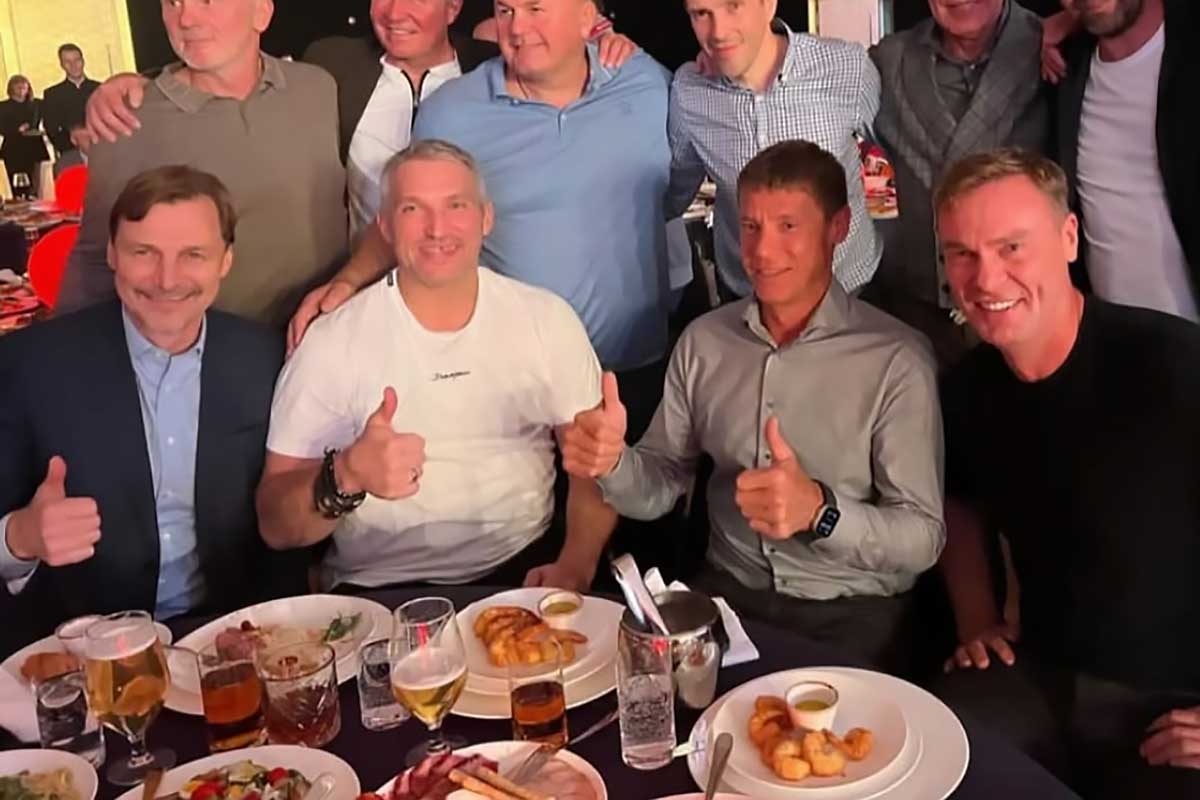Alex Ovechkin had a hat trick and five points in Pavel Datsyuk’s farewell “Magic Game.” Afterward, Ovi reunited with a trio of legendary former Capitals, who all were his linemates at one point or another, for dinner.
The photo, taken by Danis Zaripov’s wife, shows Ovechkin sitting with Sergei Fedorov, Alex Semin, and Viktor Kozlov, while Datsyuk and Zaripov, among others, stand behind them at a table.
The former Capitals combined to assist on 74 Ovechkin goals in the first decade of the all-time goals leader’s career, with Semin notching the most among the three with 45. Kozlov and Fedorov were both acquired to serve as mentors to Ovechkin and Semin, who were in their 20s at the time.
Ahead of the 2007-08 season, Kozlov was signed by then-Capitals’ general manager George McPhee in an effort to replace Dainius Zubrus, who was dealt at the trade deadline the previous year. Kozlov played two seasons with the Capitals, primarily playing on the first line with Ovechkin and Nicklas Backstrom.
Ovechkin won the Hart and Rocket Richard trophies in both campaigns, scoring a career-high 65 goals and 112 points during their first season playing together. Ovechkin recorded 222 points (121g, 101a) in the 161 total games that he played with Kozlov on the Capitals’ roster.
The two remained close even after Kozlov returned to Russia to play for the KHL’s Salavat Yulaev Ufa in 2009. Ovechkin attended Kozlov’s wedding in 2013, and the two have taken photos together when participating in Russian exhibition games.
Fedorov joined the Capitals via a deal with the Anaheim Ducks at the 2008 trade deadline. A pending unrestricted free agent that summer, Fedorov went to the Caps in exchange for prospect Theo Ruth (0 career NHL games). The deal united Fedorov with fellow Russians Ovechkin, Semin, and Kozlov.
The acquisition was particularly exciting for Ovechkin, who idolized Fedorov as a kid and owned one of his jerseys growing up.
The Capitals went on a tear during those final weeks of the regular season. Fedorov, at age 38, posted 13 points (2g, 11a) in 18 games, helping the Capitals clinch the Southeast Division title during the final home game of the season on April 5, 2008, and make the playoffs for the first time during the Ovechkin era.
Fedorov re-signed during the following summer, putting pen to paper on a one-year, $4 million contract. He’d record 33 points (11g, 22a) in 52 games during what would be his final season in the NHL. During the 2008-09 campaign, Fedorov passed Alexander Mogilny for the most goals by a Russian-born player in NHL history — a record that would stand until Ovechkin eclipsed it himself in 2015.
In the 2009 playoffs, Fedorov scored one of the biggest playoff goals in the Capitals’ franchise history to that point. The three-time Stanley Cup champion with the Detroit Red Wings snapped a shot from the right circle past Henrik Lundqvist with 4:59 remaining in Game 7. The tally would be the series-deciding goal against the New York Rangers, pushing the Capitals to the second round of the playoffs.
“He’s our leader,” Ovechkin said after the game. “He’s our best guy in the locker room. He showed it. He’s our best guy. He has more experience than anybody in this locker room. He knows how to play like that. He just shows his leadership.”
The goal would ultimately be Fedorov’s last in the NHL. He would end his career in Russia, playing three seasons with the KHL’s Metallurg Magnitogorsk.
The Capitals were a dominant offensive team, with all four Russians playing together on the ice. They even formed a unique bond off of it, too, which was captured brilliantly by this Lisa Hillary interview.
“Good memories, it was a good team,” Kozlov said in 2023. “Sergei Fedorov, young Semin, and Ovechkin. Semyon Varlamov then joined. In addition to these guys, there was a good team there. The guys were all young, but they were all good. Both Backstrom and Mike Green. The team was friendly. And it’s great that we made it to the playoffs. Our first year, we lost to Philadelphia in the first round.
“I’m glad that I was able to play with Sergei Fedorov. There was always something to talk about, a lot of interesting things to learn. [They] were two good seasons.”

